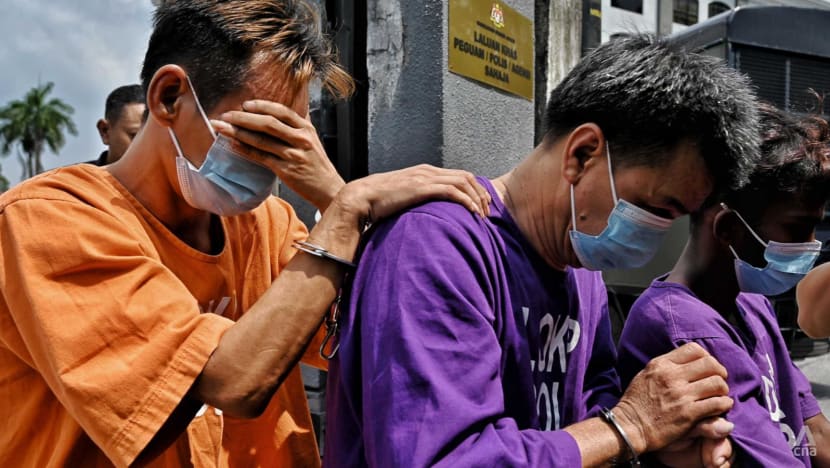Commentary: The missing Johor girl and the ensuing blame game
When a little girl went missing in Johor, the internet was quick to criticise her parents. The urge to blame parents reveals a lot about us, says mother-of-three Cherie Tseng.

The six-year-old was separated from her family at Eco Galleria, Iskandar Puteri, Johor Bahru. (Photo: Google Earth)

This audio is generated by an AI tool.
SINGAPORE: It is every parent’s worst nightmare: One moment you have your child in view, the next, they’re gone.
Your heart stops and you hold your breath as you scan your surroundings, searching for the bright blue shirt your son was wearing or the signature pigtails on your daughter. The logical part of your brain tells you there’s nothing to worry about, but your reptilian brain goes into hyperdrive.
After what feels like an eternity, you find your child on a different apparatus at the park, or at another part of the pool or in a different supermarket aisle, lured by a new toy that caught their eye.
Usually, it’s nothing. Until it’s not.
MISSING GIRL IN JOHOR
On Jul 20, just across the causeway, a six-year-old girl went missing from the Eco Galleria mall in Johor’s Iskandar Puteri, where her parents were manning a booth. She was said to have been playing near the stall before her father noticed at about 8.30pm that she had gone missing.
A nationwide manhunt ensued, and the child was found three days later at a budget hotel in Selangor, more than 350km from where she was last seen.
Five suspects have since been arrested, none of whom have any known links to the child or her family. The motive for the alleged abduction is still under investigation.
Soon after the girl was reported missing, the internet boiled over with interest: Photos of the girl were shared widely on social media and tips about possible sightings poured in. Several unrelated parties even offered cash rewards for her safe return.
However, the incident also sparked a wave of armchair critics, keyboard speculators, and moral high-horse riders.
Hurtful and unfounded speculations emerged, including claims that the alleged kidnappers were friends with the victim’s mother. Discussions bordered on parent shaming, insinuating that the parents were negligent in leaving the girl alone, or were on their phones and not paying attention to their child.
Suggestions on how parents can prevent children from going missing included holding their hands at all times, considering trackable wearables, and having better stranger-danger conversations.
It’s a pattern with social media and hot news items: Everyone is a critic, everyone an expert.

People feel the need to know if a bad thing might have a precipitating cause because we all want some measure of assurance that it won’t happen to us.
In this particular maelstrom, the subtext - well-covered by an overwhelming outpouring of collective relief and well-wishes for the family’s recovery and, in equal measure, utter derision at the alleged kidnappers and their untold agenda - rears its ugly head: Was there something the parents did or didn’t do that precipitated this? Were they too busy and thus less vigilant than they ought to have been given the missing children rate in the area?
“WHAT DID THE PARENTS DO?”
Why do people feel inclined to judge or blame a victim?
Enter the Just World Fallacy, which posits that the world is fair, just and orderly. This belief implies that individuals get what they deserve - essentially, bad things happen to bad people and good things happen to good people.
This mindset helps people navigate their physical and social environments as if they were stable and predictable. So instead of attributing a bad turn of events to bad luck, forces beyond someone’s control or nefarious actors, people tend to look at the individual’s behaviour as a source of blame. This leads to the belief that innocent victims of accidents or attacks must somehow be responsible for or deserve their misfortune.
Where parents and children are concerned, because of the protective role we ascribe to parents and the helplessness we accord to children, the positional power differential is great.
An op-ed by Ashley Frawley on British news website UnHerd titled Stop Blaming Parents For Everything reflects that it is inevitable for us to want to hold parents accountable for virtually everything that goes wrong.
Frawley jibes that we have been raised to believe that "parental behaviour management (cures) all manner of social ills".
"The good parent was beatified as one who is aware of every risk and acts accordingly. And woe betide the ‘lazy’ parent who does not. In doing so, they pointed the finger squarely at parents for nearly everything that goes wrong."
The statistics track: A 2021 global survey by Ipsos on parental perceptions showed that 82 per cent of respondents feel judged by others as a parent. Singapore ties for top spot with the United States at 92 per cent.
Their perception is real and not imagined: The same survey showed that 81 per cent of non-parents globally do indeed judge parents. Respondents in Singapore came in at a staggering 87 per cent.
It’s no wonder then that the online judging of parents is sometimes deemed a “national sport”, as penned in The Atlantic. After all, "what real-life mother could possibly measure up to a vision of motherly perfection".
EMPATHISE INSTEAD OF JUDGE
To reframe this as a problem statement: How can we become more aware of the Just World Fallacy and mitigate its influence, so we respond to others with less judgment?
“We all assume the opposite of judgment is acceptance. It’s not. It’s empathy,” Dr Kim Lian Rolles-Abraham, Head of Therapy services at Better Life Clinic, told me.
“When we shift from making judgments to seeking understanding vis-a-vis asking more empathy-laced clarifying questions, we open ourselves to seeing the full context of a person's situation. Thoughtful questions can help us connect with others' experiences and challenges, fostering a deeper sense of compassion and empathy.”
It is easy - and lazy - to assume we can know enough about another person’s past, present, or future to warrant an opinion, to cast judgment, or to offer unsolicited advice based on a snapshot of their life.
How much more grace could we bring into the world if we wondered with compassionate curiosity and responded with empathy and kindness.
Cherie Tseng is Chief Operations Officer at a local fintech company, a mother of three and editor with The Birthday Collective.


















